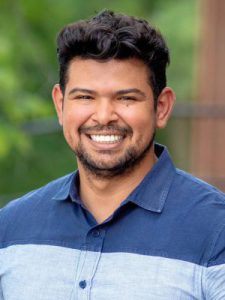Cesar Higgins Tejera

Graduate Student
What is your area of research or expertise that you bring to the Landscapes collaboration?
My research area of expertise is around cognitive decline in different racialized social groups in the United States. I work with a population-based data called the Health and Retirement Study, where we look at cognitive function trajectories among non-Hispanic Black, Hispanics, and non-Hispanic White participants. In my work, I also explore the trajectories of biomarkers of inflammation, renal functioning, and accelerated aging and their impact on cognitive functioning.
There are different angles to look at structural racism in the United States. What I’m trying to bring into the Landscape group is to better understand the relationship between biomarkers of inflammation and accelerated aging and their relation to cognitive decline in people exposed to structural racism.
What do you find challenging or exciting about interdisciplinary collaboration?
Interdisciplinary collaboration is one of the best approaches to do research, because scientists from different disciplines of the academy bring distinct perspectives on how to answer a scientific issue. In my case, my expertise on physiological biomarkers of inflammation, biostatistics, and cognition allow me to better understand proximal mechanisms related to racialized disparities in cognitive aging. However, scientists working more closely with sociological sciences may be better equipped to explain how fundamental forces in society may impact an individual’s cognitive functioning. That is why interdisciplinary work is important, because societal issues conflate at the intersection of different domains of knowledge. Therefore, having people from different backgrounds resolving matters that impact us is the best way to benefit society at large.
What’s one common misconception about your area of research that you’d like to dispel?
I work with cognitive data; people usually attribute dementia risk to individual-level factors associated with human behavior. But, I wish people knew that our active influence in the environment has important implications for cognitive aging. For example, segregation, air pollution, and environmental injustices are intrinsically linked to an increased burden on adverse cognitive outcomes in marginalized communities. I hope that we could center our attention on the effect of these injustices rather than focusing the conversation on individual responsibility.
How did you become interested in structural racism and health?
I trained in public health initially and statistics later. During my public health training we learned how the spread of exposures and diseases follow a social gradient in the lines of socio-economic position, gender, and race. Racialization is a fundamental factor implicated in the distribution of health determinants in the United States. Therefore, if you are interested in building an equitable and healthier world, then you are probably curious about the influence of societal forces in human health. That is what brought me into the study of structural racism. From a health equity perspective, I believe that we all envision a society that provides us with the means for our own development. But, when systems place us at unequal advantage, it is time to question why this is happening.
What’s the academic path that brought you to where you are now?
My journey started with medicine. I studied medicine at Universidad del Magdalena in Colombia. I finished around 2012, and then moved to the United States to pursue my masters in health policy. During my training, I got fascinated by statistics and epidemiology–I became interested in unveiling how different social factors influence the spread of diseases across populations. I pursued a masters in science in biostatistics to better characterize patterns of health and disease using statistical modeling techniques. After that, I decided that I wanted to pursue my PhD in epidemiology to link social exposures, such as racism, socioeconomic position, or education to biological factors that are proximally related to disease risk. I’m at the intersection of multidisciplinary fields such as medicine, biology, epidemiology, and social sciences.
If you had the opportunity to get one question answered by an omniscient being, what would you ask? (this is meant to be a lighthearted question–we’re trying to get to the heart of what you are most curious about, whether within your field of research or beyond! Feel free to think big!)
This question had me thinking for a little bit, to be honest! As scientists, we are very comfortable with uncertainty. But I would like our work in health equity to speed up, and I would like to know if there is an equation to get there, or a formula to get us there in the fastest way possible. I believe that through science and collaboration we can help build a more equitable society and achieve equitable health. I believe that that future is not so distant. But, how do we get there faster? That’s something that I think about a lot.
Thank you for asking these questions and having me answer them!
